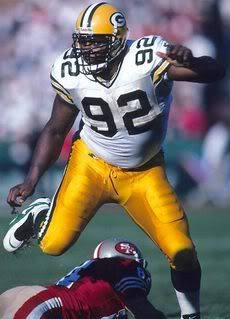Pro football players do not have a collective bargaining right to make teams open training camp.
The players “just want to play football.” Yet, they agreed that the owners could lock them out under some circumstances.
Players, through their “trade association,” filed an antitrust suit against the National Football League as a legal tactic to nullify the lockout provision in the Collective Bargaining Agreement the players claim to be defending.
Here is why an antitrust win would be disastrous. Teams could negotiate individual terms for every player it hired. The closer the player to the bottom of the roster, the more bargaining power swings to teams. Players on the bottom two-thirds of the roster are the most vulnerable because they are the most easily replaceable. Those guys would have all the bargaining power of you and me negotiating a salary with Wal-Mart.
Peyton Manning and Tom Brady would do well under that condition. The grunts who are the majority of the Association would fare badly.
Players want teams to collude, which can only happen within the law if the players bargain collectively through a labor union. Then every team must offer terms that help help every player get a better deal.
Even if the Appeals Court finds a basis for the players’ antitrust claim, events would unfold much as they are now. The players would be quick to bargain with owners collectively to set league-wide salary structure and working conditions.
The fact that DeMaurice Smith is so deeply involved in current talks supports the owners’ claim that decertification was a sham to blow-up the lockout terms in the CBA. Smith has no authority to speak for players since the players voted to decertify the union.
The only way this works is if the players reconstitute the union and ratify whatever Smith and Roger Goodell work out before the Courts and the National Labor Relations Board render judgment.
The last thing players want is to win antitrust then stand alone to deal with the owners like you and I would applying for our next job.
Points after: Gene Upshaw’s death in August 2008 was a sea change in the NFL Players’ Association’s dealings with team
Upshaw was a bridge between the bad old days for players, when teams had total control over their contracts, and the modern free agency period when Upshaw led the players in its 1992 anti-trust lawsuit against the owners. Reggie White et al v. National Football League was the latest and most successful use of the tactic that the Players’ Association employed throughout the 1980s.
The ‘Eighties were so two decades ago.
The Reggie White case was settled in 1993 when teams agreed to liberal free agency rights in exchange for a salary cap and a salary floor that set the minimum team payroll for players.
Owners like the Buffalo Bills’ Ralph Wilson hold that the salary cap, more likely the salary floor, is killing his team. The NFL hints that salary structure is as high as some team’s revenue. They’ve shown no numbers to support it. I give them the Ronald Reagan benefit of the doubt—Trust, but verify.
In the 21st Century, the last thing players want is to have a handful of player sign deals with a handful of big market NFL teams and everyone else bargain with teams that cannot afford them.
Add The Sports Daily to your Google News Feed!
